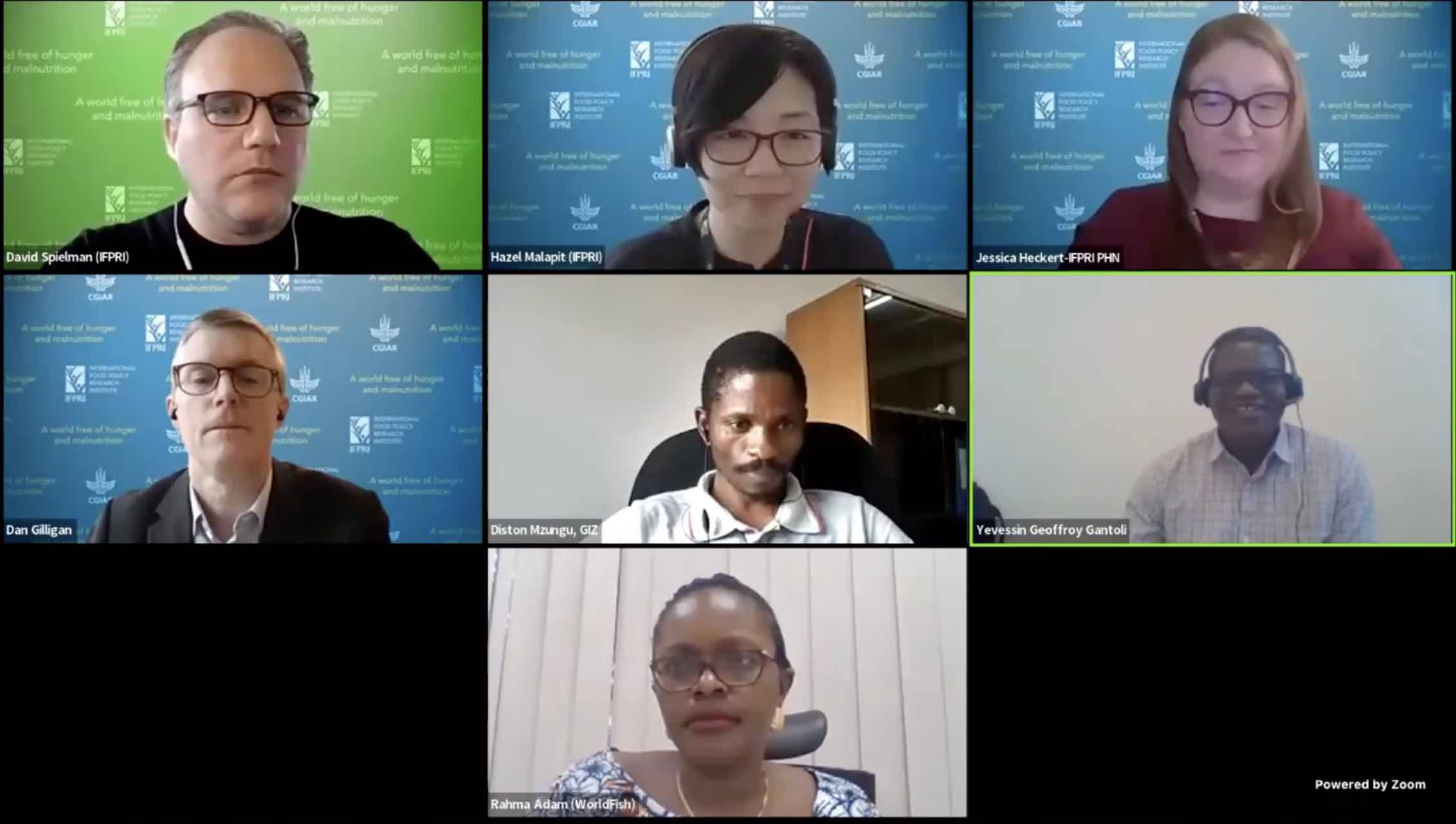Since the Women’s Empowerment in Agriculture Index (WEAI) launched in 2012, at least 247 organizations in 59 countries have used its various versions and tools for measuring women’s empowerment and gender equity. This uptake demonstrates a growing demand for validated tools focusing on these issues across geographic contexts and livelihoods.
A March 2 IFPRI policy seminar marked another expansion of the WEAI toolkit, launching new optional modules for the project-level WEAI (pro-WEAI). The new Health and Nutrition (pro-WEAI+HN) and Market Inclusion (pro-WEAI+MI) modules are designed to measure domains of agency that are important for nutrition-sensitive and market-focused agricultural development projects.
Each module adds a new set of indicators: The pro-WEAI+HN module focuses on capturing women’s health and nutrition agency, while the pro-WEAI+MI module measures barriers to market access and inclusion for different value chain actors. Both include multiple individual indicators and are intended to be used in addition to core pro-WEAI. The development of these indicators was supported by the Bill & Melinda Gates Foundation, Deutsche Gesellschaft für Internationale Zusammenarbeit (GIZ), the Millennium Challenge Corporation, the U.S. Agency for International Development (USAID), and the former CGIAR Research Programs on Policies, Institutions, and Markets (PIM) and Agriculture for Nutrition and Health (A4NH).
In her opening remarks, Purnima Menon, CGIAR Senior Director for Food and Nutrition Policy and IFPRI Senior Research Fellow, emphasized the importance of nutrition-sensitive agriculture and the need for tools to measure the impact of agricultural programs on women’s empowerment and nutrition outcomes. The use of the WEAI tools, including pro-WEAI, has furthered the effort to “capture the dynamics and balance of power in intrahousehold decision-making in critical issues around agriculture,” she said.
Keynote speaker Shakuntala Thilsted, Director of the CGIAR Nutrition, Health and Food Security Impact Area Platform (appearing via video recording), underlined the importance of using validated means to measure women’s empowerment and agency, and understand their impact on diet, nutrition, and health.
Keynote speaker Inge Brouwer, of Wageningen University & Research (Netherlands) and researcher for the CGIAR Initiative on Sustainable Healthy Diets through Food Systems Transformation (SHiFT) stressed the growing demand for data regarding women’s engagement in food systems and markets, and the potential for pro-WEAI+MI to help meet this demand.
Introducing the pro-WEAI+HN module, Jessica Heckert, IFPRI Research Fellow, explained how its indicators were developed and validated using data from six projects that were part of the Gender, Agriculture, and Assets Project Phase 2 (GAAP2), a portfolio of 13 agricultural development projects that implemented studies across sub-Saharan Africa and South Asia and participated in the development of pro-WEAI. The module’s seven indicators measure women’s agency around decisions on their own health and diet, healthcare seeking, their children’s diets, as well as whether they can purchase of acquire health products.
Hazel Malapit, IFPRI Senior Research Coordinator, introduced pro-WEAI+MI, focusing on its use in measuring women’s empowerment at higher nodes of the agricultural value chain, such as processing and marketing. The market inclusion indicators were developed and validated through an iterative process of quantitative and qualitative data collection in four country studies in the Philippines, Bangladesh, Benin, and Malawi, adapting the indicators and tools to the objectives and context of each study. The six new indicators are designed to measure instrumental and intrinsic agency at the individual level and to capture factors in the empowerment environment. For intrinsic agency, these include “entrepreneurial mindset” and “autonomy in working conditions”; for instrumental agency, “control over income and outputs from the main value chain” and “input in decisions about the main value chain”; and for the empowerment environment, “access to reliable sanitation while working” and “feels safe from sexual harassment.”
Panel discussants—including Elizabeth Kirkwood, Research Fellow at the Sydney School of Public Health at the University of Sydney; Rahma Adam, Social Inclusion and Markets Scientist at WorldFish; Geoffroy Gantoli, regional coordinator (West Africa and Tunisia) for Agricultural Technical Vocational Education and Training (ATVET) with GIZ; and David Spielman, Senior Research Fellow and Program Leader with IFPRI’s Rwanda office—shared experiences using the new modules in recent or ongoing research. The panelists all emphasized the value of expanding the capacity for gender-sensitive data collection.
In her closing remarks, Farzana Ramzan, USAID Senior Gender Advisor, noted that earlier this year, the U.S. government launched its first-ever interagency strategy on global women’s economic opportunities. USAID and other agency partners identified a gap in the ability to identify and measure the barriers to women’s and men’s market access and inclusion—making it hard to track progress in reducing those barriers. In this regard, she said, the new pro-WEAI modules proved very useful in understanding the empowerment environment—particularly the pro-WEAI+MI “access to sanitation” and “feeling safe from sexual harassment” indicators, and the pro-WEAI+HN indicators for measuring agency in diets and health. The indicators, she said, have helped to inform USAID strategies aimed at reducing barriers for market inclusion for women and men and improving women’s decision-making power in food, nutrition, health and water systems projects.
Simone Faas is a Research Analyst with IFPRI’s Poverty, Gender, and Inclusion Unit.







